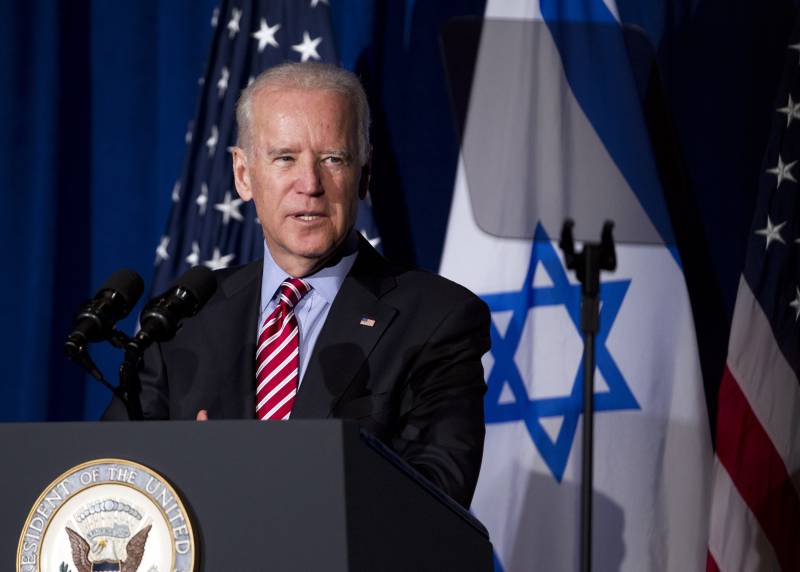Former vice-president Joe Biden has pledged to break with US President Donald Trump's 'America First' policy, but pundits fear his projected election could see a return to the military interventionist policies of the Barack Obama administration.
Projected US president-elect Joe Biden has pledged his "deep commitment" to Israel's security in a call with Prime Minister Benjamin Netanyahu.
The two men had “a warm conversation” on Tuesday in which Biden “reiterated his deep commitment to the State of Israel and its security”, and Israeli government statement said.
“The two agreed to meet soon to discuss the many issues that are pending and reaffirmed the need to continue to strengthen the strong alliance between the United States and Israel,” it read.
In contrast to earlier comments by Netanyahu, the statement referred to Biden as "president-elect" - despite sitting President Donald Trump's ongoing legal challenge to the election process in several states and the fact that the vote count is not yet been complete two weeks after the November 3 election.
While Biden has pledged to follow a different path to Trump's 'America First' approach to foreign relations, political commentators and his own team have indicated little will change regarding the Middle East.
"He is going to be great for Israel and the region," Democrats Abroad Israel vice-chair Elana Sztokman said of Biden late last month.
Biden's foreign policy advisor Tony Blinken said just before the US election that a future Biden government would "take a hard look" at Trump's decision to sell Lockheed F-35 Lightning II stealth attack jets to the United Arab Emirates (UAE).
Blinken criticised the decision as looking too much like a "quid pro quo" for the UAE's normalisation of relations with Tel Aviv and de-facto recognition of the Israeli state earlier this year, which was touted as a major foreign policy coup for Trump.
"As a basic principle, encouraging Arab countries to recognize and normalize with Israel is something we supported during the Obama-Biden administration and would support in a Biden administration", Blinken said.
Fears expressed by Trump's opponents on both sides of the partisan divide - and within government departments - that he would use the remaining two months of his current term to pull most of the remaining US troops out of Afghanistan and Iraq were confirmed on Tuesday by acting Pentagon Chief Christopher Miller. The president's sacking of defence secretary Mark Esper and the departure of Syria envoy Jim Jeffrey - who admitted last week to playing a "shell game" on troop numbers to stop Trump ending the illegal US occupation of Syrian oil fields - may be signs of more radical moves afoot.
IDF Claims Struck 'Iranian Quds Force & Syrian Armed Forces Targets' in Syria
Earlier on Wednesday, state-run Syrian Arab News Agency (SANA) reported that explosions could be heard in the sky above the Syrian capital city of Damascus, as Syrian Air Defences responded to what it described as "Israeli aggression".
Israeli Defence Forces (IDF) stated it had stricken "Iranian Quds & Syrian Armed Forces targets" in Syria on Wednesday, saying that the attack was a response to Iran and Syria earlier placing "improvised explosive devices by the Alpha Line to hit Israeli troops".
"The attack damaged warehouses, headquarters and military complexes, as well as batteries of surface-to-air missiles", IDF said. "The unveiling of the cargo arena yesterday is further proof of Iran's long-standing establishment in Syria. The IDF considers the Syrian regime responsible for any action taken on its territory and will continue to act as necessary to eradicate the Iranian establishment in Syria, which poses a risk to security stability in the region".
What Iran & Syria did: placed improvised explosive devices by the Alpha Line to hit Israeli troops.
What we did: just struck Iranian Quds Force & Syrian Armed Forces targets in Syria.
We stand prepared to operate against Iranian entrenchment in Syria.
— Israel Defense Forces (@IDF) November 18, 2020
Prior to the IDF statement, SANA reported on early Wednesday that explosions could be heard in the sky above Damascus. In a follow-up report, SANA said, citing a Syrian military source, that three soldiers were killed and one injured as a result of the attack.
"The aggression resulted in the death of three soldiers, the wounding of one soldier and some material losses", an unnamed Syrian military source told SANA.
According to SANA, rockets were launched from the southern region of "the occupied Syrian Golan Heights".
This is not the first time when the IDF conducts airstrikes, targeting what it describes as Iranian-backed military objects in Syria and attacking Syrian army facilities. Earlier in autumn, the Israeli armed forces confirmed striking Syrian military targets on 21 September.
In August, Syrian Air Defences intercepted several Israeli rockets, according to SANA. The reported strike killed two Syrian soldiers and wounded seven others, SANA noted.






